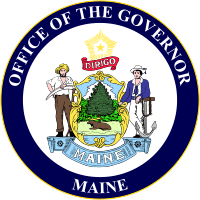Israel Washburn, Jr.
| Israel Washburn, Jr. | |
|---|---|
 | |
| Member of the U.S. House of Representatives from Maine's 5th district | |
|
In office March 4, 1853 – January 1, 1861 | |
| Preceded by | Ephraim K. Smart |
| Succeeded by | Stephen Coburn |
| Member of the U.S. House of Representatives from Maine's 6th district | |
|
In office March 4, 1851 – March 3, 1853 | |
| Preceded by | Charles Stetson |
| Succeeded by | Thomas J. D. Fuller |
| 29th Governor of Maine | |
|
In office January 2, 1861 – January 7, 1863 | |
| Preceded by | Lot M. Morrill |
| Succeeded by | Abner Coburn |
| Personal details | |
| Born |
June 6, 1813 Livermore, Maine |
| Died |
May 12, 1883 (aged 69) Philadelphia, Pennsylvania |
| Political party |
Whig Republican |
| Profession | Law |
| Religion | Universalist[1] |
Israel Washburn, Jr. (June 6, 1813 – May 12, 1883) was a United States political figure. Originally a member of the Whig Party, he later became a founding member of the Republican Party. In 1842, Washburn served in the Maine House of Representatives.[2]
In 1854, angry over the passage of the Kansas-Nebraska Act, Washburn called a meeting of 30 members of the US House of Representatives to discuss forming what became the Republican Party. Republican gatherings had taken place in Wisconsin and Michigan earlier in the year, but Washburn's meeting was the first in the U.S. Capital, and among U.S. Congressmen. He was probably also the first politician of his rank to use the term "Republican", in a speech at Bangor, Maine on June 2, 1854.[3] Washburn represented the district which included Bangor and the neighboring town of Orono, Maine, where he had his home and law office.
Born in 1813 in Livermore, Maine to a prominent political family, Washburn organized the Maine Republican Party from 1854 onward. He was the 29th Governor of Maine from 1861 to 1863. During the American Civil War, he helped recruit Federal troops from Maine. In 1862, he attended the Loyal War Governors' Conference in Altoona, Pennsylvania, which ultimately gave Abraham Lincoln support for his Emancipation Proclamation.
Washburn had been an unsuccessful candidate for the Thirty-first Congress in 1848; elected as a Whig to the Thirty-second and Thirty-third Congresses, as a Republican to the Thirty-fourth, Thirty-fifth, and Thirty-sixth Congresses and served from March 4, 1851, to January 1, 1861, when he resigned, having been elected Governor. He was Chairman of the Committee on Elections (Thirty-fourth Congress).
Washburn was the brother of Elihu B. Washburne, Cadwallader C. Washburn, William D. Washburn, Samuel Benjamin Washburn, and Charles Ames Washburn. He died in 1883 in Philadelphia, Pennsylvania. He is buried at the Mount Hope Cemetery in Bangor, Maine.
The town of Washburn, Maine is named in his honor.
Notes
- ↑ http://www.harvardsquarelibrary.org/universalists/Israel-Washburn-Jr.php
- ↑ Maine State Law and Legislative Reference Library-Maine Legislators Database
- ↑ William E. Gienapp, The Origins of the Republican Party (Oxford, 1987), p. 89
References
-
 This article incorporates public domain material from the Biographical Directory of the United States Congress website http://bioguide.congress.gov.
This article incorporates public domain material from the Biographical Directory of the United States Congress website http://bioguide.congress.gov. - Hanson, Mary E. Hanson.:, In memoriam. Israel Washburn, Jr: born June 5, 1813, died May 12, 1883 (1884).
- Gienapp, William E.:, The Origins of the Republican Party (Oxford, 1987), p. 89.
External links
- United States Congress. "Israel Washburn, Jr. (id: W000173)". Biographical Directory of the United States Congress.
- Israel Washburn, Jr. at Find a Grave
- The Washburn Family
| United States House of Representatives | ||
|---|---|---|
| Preceded by Charles Stetson |
Member of the U.S. House of Representatives from Maine's 6th congressional district March 4, 1851 – March 3, 1853 |
Succeeded by Thomas J. D. Fuller |
| Preceded by Ephraim K. Smart |
Member of the U.S. House of Representatives from Maine's 5th congressional district March 4, 1853 – January 1, 1861 |
Succeeded by Stephen Coburn |
| Political offices | ||
| Preceded by Lot M. Morrill |
Governor of Maine 1861–1863 |
Succeeded by Abner Coburn |
